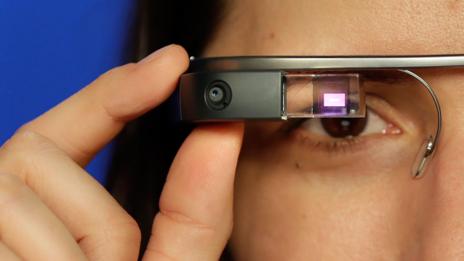—

Scientists have for the first time separated a particle from one of its physical properties — creating a “quantum Cheshire Cat”.
The phenomenon is named after the curious feline in Alice in Wonderland, who vanishes leaving only its grin.
By James Morgan — Science reporter, BBC News

Scientists have for the first time separated a particle from one of its physical properties — creating a “quantum Cheshire Cat”.
The phenomenon is named after the curious feline in Alice in Wonderland, who vanishes leaving only its grin.
 We live in world, where technological advances continually allow new and provocative opportunities to deeply explore every aspect of our existence. Understanding the human brain remains one of our most important challenges– but with 100 billion neurons to contend with, the painstakingly slow progress can give the impression that we may never succeed. Brain mapping research unlocks secrets to our mental, social and physical wellness.
We live in world, where technological advances continually allow new and provocative opportunities to deeply explore every aspect of our existence. Understanding the human brain remains one of our most important challenges– but with 100 billion neurons to contend with, the painstakingly slow progress can give the impression that we may never succeed. Brain mapping research unlocks secrets to our mental, social and physical wellness.
In our upcoming releases for the Galactic Public Archives, noted American PhD Neuroscientist and Futurist, Ken Hayworth outlines why he feels that mapping the brain will not be a quixotic task. Through this, he reveals his unconventional plan to ensure humanity’s place in the universe—forever.
We admit to teasing you with the below link in preparation for the main events.
In 1906 the great American pragmatist philosopher William James delivered a public lecture entitled, ‘The Moral Equivalent of War’. James imagined a point in the foreseeable future when states would rationally decide against military options to resolve their differences. While he welcomed this prospect, he also believed that the abolition of warfare would remove an important pretext for people to think beyond their own individual survival and toward some greater end, perhaps one that others might end up enjoying more fully. What then might replace war’s altruistic side?
It is telling that the most famous political speech to adopt James’ title was US President Jimmy Carter’s 1977 call for national energy independence in response to the Arab oil embargo. Carter characterised the battle ahead as really about America’s own ignorance and complacency rather than some Middle Eastern foe. While Carter’s critics pounced on his trademark moralism, they should have looked instead to his training as a nuclear scientist. Historically speaking, nothing can beat a science-led agenda to inspire a long-term, focused shift in a population’s default behaviours. Louis Pasteur perhaps first exploited this point by declaring war on the germs that he had shown lay behind not only human and animal disease but also France’s failing wine and silk industries. Moreover, Richard Nixon’s ‘war on cancer’, first declared in 1971, continues to be prosecuted on the terrain of genomic medicine, even though arguably a much greater impact on the human condition could have been achieved by equipping the ongoing ‘war on poverty’ with comparable resources and resoluteness.
Science’s ability to step in as war’s moral equivalent has less to do with whatever personal authority scientists command than with the universal scope of scientific knowledge claims. Even if today’s science is bound to be superseded, its import potentially bears on everyone’s life. Once that point is understood, it is easy to see how each person could be personally invested in advancing the cause of scientific research. In the heyday of the welfare state, that point was generally understood. Thus, in The Gift Relationship, perhaps the most influential work in British social policy of the past fifty years, Richard Titmuss argued, by analogy with voluntary blood donation, that citizens have a duty to participate as research subjects, but not because of the unlikely event that they might directly benefit from their particular experiment. Rather, citizens should participate because they would have already benefitted from experiments involving their fellow citizens and will continue to benefit similarly in the future.
However, this neat fit between science and altruism has been undermined over the past quarter-century on two main fronts. One stems from the legacy of Nazi Germany, where the duty to participate in research was turned into a vehicle to punish undesirables by studying their behaviour under various ‘extreme conditions’. Indicative of the horrific nature of this research is that even today few are willing to discuss any scientifically interesting results that might have come from it. Indeed, the pendulum has swung the other way. Elaborate research ethics codes enforced by professional scientific bodies and university ‘institutional review boards’ protect both scientist and subject in ways that arguably discourage either from having much to do with the other. Even defenders of today’s ethical guidelines generally concede that had such codes been in place over the past two centuries, science would have progressed at a much slower pace.
The other and more current challenge to the idea that citizens have a duty to participate in research comes from the increasing privatisation of science. If a state today were to require citizen participation in drug trials, as it might jury duty or military service, the most likely beneficiary would be a transnational pharmaceutical firm capable of quickly exploiting the findings for profitable products. What may be needed, then, is not a duty but a right to participate in science. This proposal, advanced by Sarah Chan at the University of Manchester’s Institute for Bioethics, looks like a slight shift in legal language. But it is the difference between science appearing as an obligation and an opportunity for the ordinary citizen. In the latter case, one does not simply wait for scientists to invite willing subjects. Rather, potential subjects are invited to organize themselves and lobby the research community with their specific concerns. In our recent book, The Proactionary Imperative, Veronika Lipinska and I propose the concept of ‘hedgenetics’ to capture just this prospect for those who share socially relevant genetic traits. It may mean that scientists no longer exert final control over their research agenda, but the benefit is that they can be assured of steady public support for their work.
FUTURISM UPDATE (September 30, 2014)
LIVE SCIENCE: Higgs Boson to the World Wide Web: 7 Big Discoveries Made at CERN http://www.livescience.com/48052-cern-anniversary-big-discoveries.html
3-D PRINT: NYC Engineer 3D Prints a Mechanical Computer, The Turbo Entabulator http://3dprint.com/16795/3d-printed-computer/
Singularity University

In the last century, breakthroughs in modern medicine have driven big gains in quality and length of life. Antibiotics, immunization, imaging and radiology, complex surgery, minimally invasive surgery—and more. It’s a long, impressive list.
But what will the next hundred years bring?
An innovative Australian digital radar built with a series of modified rugby goalposts is attracting worldwide attention the ABC reports.
A consortium led by La Trobe University in Melbourne developed the Tiger-3 digital radar, which is 10 times more sensitive than any other research radar. Lead researcher Professor John Devlin said the radar would be used to study space weather, which has an impact on navigation and surveillance systems for shipping and aircraft, as well as for GPS systems. “It measures the ionospheric reflections from a distance out to about 5,000 kilometres,” he said.
Researchers measure the data to study space weather, like recent solar flares, which can potentially knock out power, satellites, navigation and surveillance systems for shipping, aircraft and GPS.
The recent solar flares just grazed the Earth, but Dr Custovic said flares had the potential to knock out transformers, potentially shutting off power for weeks.
Continue reading “Australian digital radar innovation attracts global attention” »
DETAILS DO NOT EVER SUFFICE. FOCUS AND FOCUS! [GRAPHIC]
Authored By Copyright Mr. Andres Agostini
White Swan Book Author (Source of this Article)
Continue reading “DETAILS DO NOT EVER SUFFICE. FOCUS AND FOCUS! [GRAPHIC]” »
By Michael Harris — Wired

Recently, my two-year-old nephew Benjamin came across a copy of Vanity Fair abandoned on the floor. His eyes scanned the glossy cover, which shone less fiercely than the iPad he is used to but had a faint luster of its own. I watched his pudgy thumb and index finger pinch together and spread apart on Bradley Cooper’s smiling mug. At last, Benjamin looked over at me, flummoxed and frustrated, as though to say, “This thing’s broken.”
Search YouTube for “baby” and “iPad” and you’ll find clips featuring one-year-olds attempting to manipulate magazine pages and television screens as though they were touch-sensitive displays. These children are one step away from assuming that such technology is a natural, spontaneous part of the material world. They’ll grow up thinking about the internet with the same nonchalance that I hold toward my toaster and teakettle. I can resist all I like, but for Benjamin’s generation resistance is moot. The revolution is already complete.

A presumably naked man laughs open-mouthed as water trickles from his bright red face, soaking the Google Glass headset he is wearing in the shower. This infamous image, posted online by tech futurist Robert Scoble just over 12 months ago, encapsulated the excitement among early adopters of this technology. Glass, a voice-controlled wearable headset connected to the internet, promised a transformation of the way we interact with computers, and each other.
A year on and it’s Scoble’s enthusiasm that has been dampened. “I’m wearing it right now,” he says. “It’s really useless. I can’t store more than 20 contacts, and I can’t take photos and put them on Instagram or Facebook. Getting apps on here is a pain.”
Apple, Berkshire Hathaway Corporation, Mitsubishi Motors, Honda, Daimler-Chrysler’s Mercedes-Benz, Toyota, Royal Dutch Shell Oil Company, Google, Xerox, Exxon-Mobil, Boeing, Amazon, Procter & Gamble, NASA and DARPA, Lockheed Martin, RAND Corporation and HUDSON Institute, Northrop Grumman Corporation, GEICO, Microsoft, etc.
FOREWORD:
You are going to need to prepare thyself breathtakingly. You will need a Brioni suit and a silk tie and understand, later on below this material, how to get lucky via Rampant Rocket Science.
Continue reading “Getting Apple, Microsoft and Fortune-500s to Uninterruptedly Buy From You!” »
